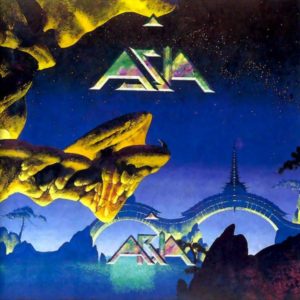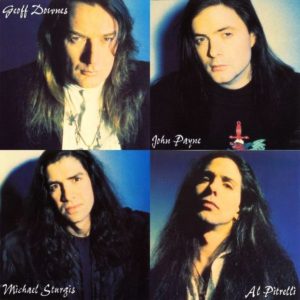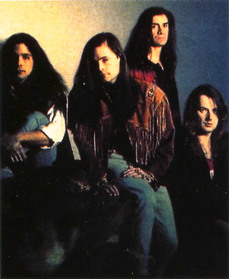 By 1994, what was considered rock music changed. Anything the band Asia could have done at this point, with any of their member configurations, would have sounded dated and irrelevant, at least in the United States. Asia still had major-label contracts in Europe and continental Asia, so any perception of diminishment was blunted in those territories. How did they respond to Aria, the second effort with John Payne as lead singer? That I couldn’t tell you.
By 1994, what was considered rock music changed. Anything the band Asia could have done at this point, with any of their member configurations, would have sounded dated and irrelevant, at least in the United States. Asia still had major-label contracts in Europe and continental Asia, so any perception of diminishment was blunted in those territories. How did they respond to Aria, the second effort with John Payne as lead singer? That I couldn’t tell you.
I bring all of this up to reiterate something I say a lot: context matters. In the U.S., Aria emerged from the Bullet Proof record label, and if you are now asking “What the hell is Bullet Proof Records,” then you make my point for me. Long away from their time with Geffen Records, this felt like a big demotion. That perception tended to color one’s impression of the record at the time of its release. The Roger Dean art on the front of the CD jewel case seemed consistent, but the text on the back, added in the Comic Sans font, looked slapdash and cheap. None of this ought to bias a listener, but humans are visual creatures first.
A tangent: Asia being on a small label should not have been that big a deal. Most bands that were relevant in the 1970s and 1980s, provided they survived either decade without completely melting down, landed in similar circumstances. Foreigner’s Mr. Moonlight appeared on a subsidiary of indie Priority Records, known more for hits compilations and rap acts than rock. 10cc and The Tubes were, likewise, on labels no one heard of, labels that probably had no budget to do proper promotion and, if they did, were likely more inclined to let name recognition do the heavy lifting for them. In all these cases, the “zip code” should have had no impact on how one engaged with the music. Regularly, it did. End of rant.
 The previous Asia album, Aqua, had a small collection of good songs that were held back by a heavy-handed approach. The album had a few raging clunkers too, and those tracks had the weird effect of sucking the oxygen away from the better efforts. You can blame the mish-mash lineup-go-round that was the group’s membership at that moment. But in ’94, the band was relatively stable. Geoff Downes was arguably the leader of the band, and John Payne seemed firmly in place as singer. Al Pitrelli carried over from Aqua as the guitarist. He was the primary player on that record anyway, even though many point to Steve Howe’s contribution, minimal though it was. Michael Sturgis was now the drummer.
The previous Asia album, Aqua, had a small collection of good songs that were held back by a heavy-handed approach. The album had a few raging clunkers too, and those tracks had the weird effect of sucking the oxygen away from the better efforts. You can blame the mish-mash lineup-go-round that was the group’s membership at that moment. But in ’94, the band was relatively stable. Geoff Downes was arguably the leader of the band, and John Payne seemed firmly in place as singer. Al Pitrelli carried over from Aqua as the guitarist. He was the primary player on that record anyway, even though many point to Steve Howe’s contribution, minimal though it was. Michael Sturgis was now the drummer.
I imagine having the pieces in place helped a lot. Several of the songs on Aria benefit from Payne sounding more relaxed in his role. Oh, there are still the occasional stretches of vocal strain, such as the pre-chorus parts of opening track “Anytime,” but the track ends up being an entertaining rock anthem in spite of this. In fact, “Anytime,” “Enough’s Enough,” and the disc’s best song “Summer” all sound of a piece with the John Wetton Asia efforts prior to Payne’s entry. All three songs would have fit, at least tonally, with the odds and ends on Then And Now.
 In terms of the songs themselves, I think Aqua had a few stronger compositions. Aria is purposefully trying to not overextend itself, and that occasionally leads to some weak lyrics. But as a start-to-finish experience, Aria rises head and shoulders over Aqua. There was little temptation to skip songs on Aria.
In terms of the songs themselves, I think Aqua had a few stronger compositions. Aria is purposefully trying to not overextend itself, and that occasionally leads to some weak lyrics. But as a start-to-finish experience, Aria rises head and shoulders over Aqua. There was little temptation to skip songs on Aria.
It still has some issues. The centerpiece song “Desire” is a sexy song, and if you just recoiled a little bit at the notion alone, you can see how problematic the song can be. Throughout the band’s totality, Asia songs have been primarily about survival: surviving the unknown, surviving war, and surviving heartbreak. They were at their weakest when they addressed physical love. Such is the case with progressive rock, or pseudo-progressive rock such as Asia is. We generalize it with long, flashy instrumental solos, undanceable tempos, and either super-cerebral or abstract topics. John Payne exhorting, “Desire! Make it physical!” has the same incongruity as your dad dabbing to show you he’s down with those millennials. Is “Desire” a bad song? I wouldn’t go that far. “Back In Town” from Aqua was a bad song. This one simply seems a little misguided. (The song is reprised in the last track, “Aria.”)
The other problem with the record is that most of the songs have a similar tempo with very few digressions. That can occasionally muddy the identities of tracks, song-by-song. Even so, Asia is to be commended for really trying to assess the shortcomings of the previous record and, by and large, attempting to remedy them. It generally works, and I have to give the record credit that I was unable to afford it in the ’90s.
I mentioned earlier that I called Asia “pseudo-prog,” alleging that they were shooting more for the Album Oriented Rock side of their personality at this stage. In the next part of this series, Asia attempts to fully claim the progressive genre for themselves.





Comments